Dialogue with the investor: A live example and analysis of the situation
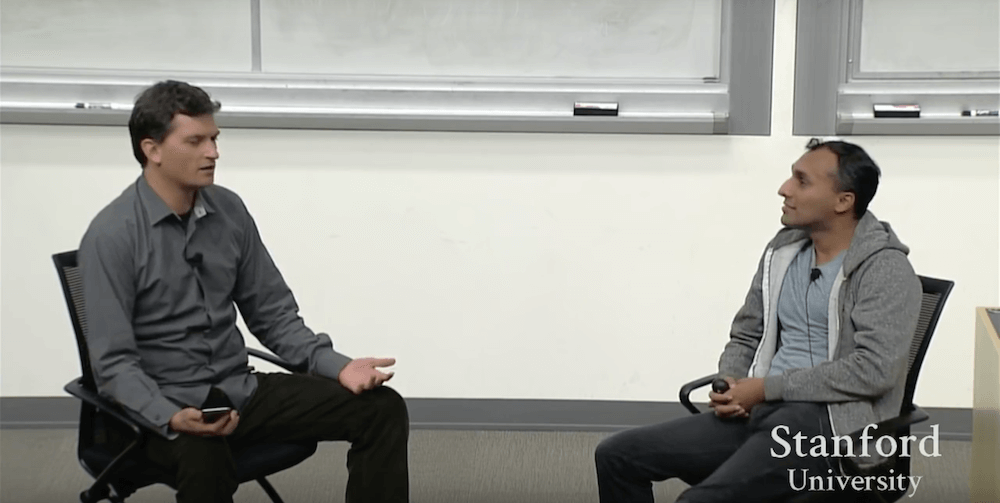
Stanford course CS183B: How to start a startup . Started in 2012 under the leadership of Peter Thiel. In the fall of 2014, a new series of lectures by leading entrepreneurs and Y Combinator experts took place:
Second part of the course
- Kirsty Nate and Carolynn Levy: Legal Basis for Startup Launch ;
- Kirsty Nate and Carolynn Levy: The Basics of Attracting Investments ;
- Kirstie Nate and Carolynn Levy: Employee Basics ;
- Tyler Bosmen: Where to start and how to communicate with customers ;
- Michael Sable and Casar Younis: How to convince an investor and get financing .
First part of the course
- Sam Altman and Dustin Moskovitz: How and why to create a startup?
- Sam Altman: How to form a start-up team and culture?
- Paul Graham: Illogical startup ;
- Adora Cheung: Product and Honesty Curve ;
- Adora Cheung: The rapid growth of a startup ;
- Peter Thiel: Competition - the lot of losers ;
- Peter Thiel: How to build a monopoly?
- Alex Schulz: An introduction to growth hacking [ 1 , 2 , 3 ];
- Kevin Hale: Subtleties in working with user experience [ 1 , 2 ];
- Stanley Tang and Walker Williams: Start small ;
- Justin Kahn: How to work with specialized media?
- Andressen, Conway and Conrad: What an investor needs ;
- Andressen, Conway and Conrad: Seed investment ;
- Andressen, Conway and Conrad: How to work with an investor ;
- Brian Cesky and Alfred Lin: What is the secret of company culture?
- Ben Silberman and the Collison Brothers: Nontrivial aspects of teamwork [ 1 , 2 ];
- Aaron Levy: Developing B2B Products ;
- Reed Hoffman: On Leadership and Managers ;
- Reed Hoffman: On the leaders and their qualities ;
- Keith Rabois: Project Management ;
- Keith Rabua: Startup Development ;
- Ben Horowitz: Dismissal, promotion and reassignment ;
- Ben Horowitz: Career advice, westing and options ;
- Emmett Shire: How to conduct interviews with users;
- Emmett Shire: How to talk to users in Twitch ;
- Hossein Rahman: How hardware products are designed in Jawbone;
- Hossein Rahman: The Design Process at Jawbone.
')
Dalton: Hello everyone! My name is Dalton Caldwell. I am one of the partners of YC. Now we will try to demonstrate how the meeting with investors usually looks. Perhaps it will look a bit wry. We will hold this meeting in a small class format.
We will try to make it as interesting as possible and show what it is. Of course, you can say that this does not seem like a real meeting with investors, but we have something to show you.
I will tell a little about myself. During my career, I managed to attract a total of $ 85 million from several companies, so I have some experience in dealing with investors. Here I will try to share them. So, now we will try to show you what usually happens at meetings with investors.
Casar: have you talked about yourself yet?
Kasar:::: I launched a couple of startups. I think that's enough.
Dalton: Great. Now we will simulate two meetings and try to do it as quickly as possible. As Michael said, such meetings should take place quickly. Let's start with the first.
Kasar:: I understand that today you want to introduce your company. Tell us what you do?
Kasar::: We are developing a platform that allows companies and consumers to communicate with each other through a single channel, and not the way it is happening now.
Dalton: I do not understand.
Kasar::: Take, for example, WhatsApp or Snapchat. These platforms are designed for ordinary users. We want to create the same, only for companies. That is, we want ordinary users to communicate with company representatives. This is the essence of our business. This is what our startup does.
Dalton: Who uses your product? What tasks does he perform?
Kasar:::: It is intended for consumers and companies. Our product is designed to communicate and allows you to send ...
Dalton: Why should consumers use your product?
Casar::: Because they want to communicate with companies.
Dalton: Good. What can you tell about the market and the possibilities of your product? What is the scale of your company?
Kasar::: It is clear that messenger developers are quite large companies. WhatsApp was bought for $ 19 billion. Snapchat is also growing at a very fast pace. It seems to us that our product has great prospects.
Dalton: Can you tell us about your achievements, results? Have you shown your product to users?
Kasar:: We do not want to reveal all the secrets and will not go into details. At one of the events I talked about my company for about an hour. We have several thousand users. Our clients are several hundred companies.
Dalton: Can you name them?
Casar:: You know them. I do not want to go into details, because while we are just starting our activities and do not want to create too much noise around ourselves
Dalton: I see. Can you tell me what new things you have learned? What feedback do you get from customers?
Kasar:: Yes, users can now send messages to companies. We think it's great. Moreover, these companies respond to received messages. I think few expected it.
Dalton: Tell us about your business model.
Casar:: We are going to charge companies a month. We have not yet decided what the fee will be. For now, we are giving several hundred companies the opportunity to use our product for free, but we are going to introduce a monthly fee.
Dalton: How much do you think companies will be willing to pay?
Kasar:: We believe they will be able to pay at least 10-15 thousand dollars a month.
Dalton: Good. Can you tell us a little about your team?
Casar:: Yes, we have five founders. In fact, I am the only one who is full-time. This is temporary until we raise money. Therefore, at any time we can involve the rest of the team.
Dalton: Do any of the founders know how to program?
Casar : Of course. One has a PhD in biological sciences, but he programs very well. I write programs in Python. I studied it myself.
Dalton: Well, our time has come to an end. It was nice to talk with you. Keep me posted.
Kasar:: I will inform you about the latest news. Thank.
Dalton: Now let's look at the situation. It is clear that the founder acted inefficiently. Consider some errors. First, make sure the person you are talking to understands what you are doing.
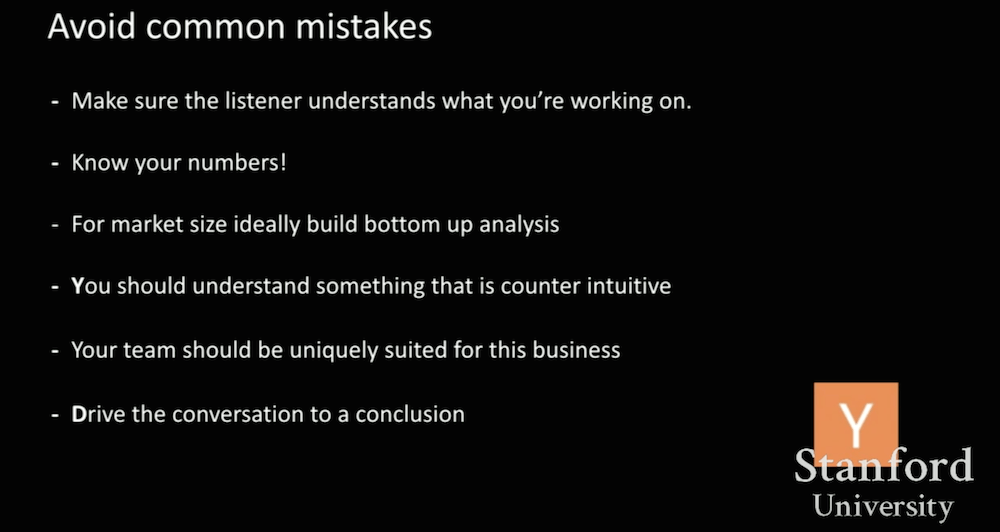
Casar:: It's harder than it looks.
Dalton: Very often at such meetings, people start to get excited. They get nervous and start talking fast. You will never convince anyone of anything if your interlocutor cannot understand what your product is doing. Obviously, you should know all your indicators. If your details are inaccurate and you can’t say anything concrete, it’s better not to make an appointment. If you do not want to inform the investor about your performance, it is better not to make an appointment. This means that you are simply not ready for it.
Regarding the size of the market, try to present the results of your analysis. Do not just call the names of companies that are not related to your business. The founders, unfortunately, do this very often. From a conversation with you, an investor should learn something new. Next, tell us why you are working on this product. Why exactly are you doing this? And is it worth doing this in principle? In the end, the founder did not try to keep the conversation going. Already at the very beginning it became clear that he would fail. So he just started talking nonsense, until I stopped him.
It was not the best presentation of his company. Let's try again.
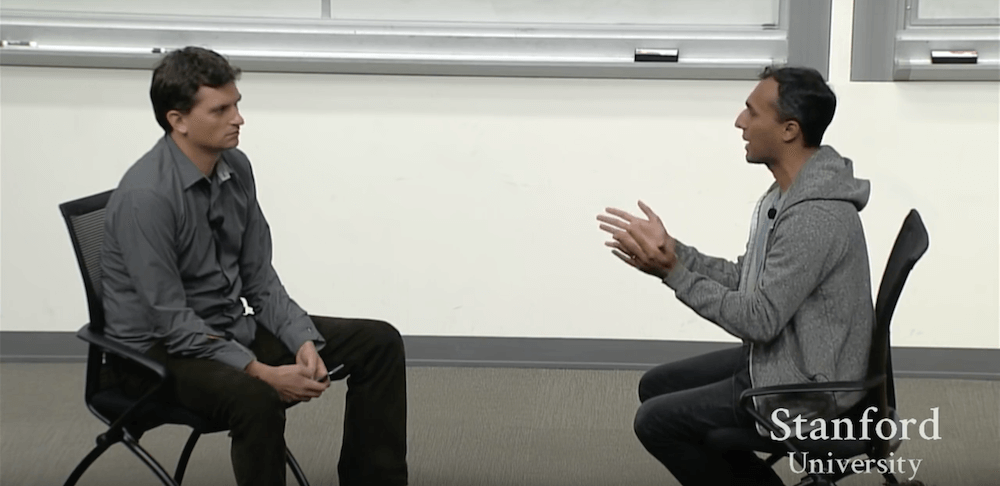
Casar: I understand that you work for a company. Tell me what she does?
Casar:: We are developing an application for communication. This is speaking in general. In fact, our application allows ordinary users to communicate with shop owners.
Say, if you are walking along Crate & Barrel, you can send a message to its owner, for example: “Somebody litters you in the lobby”. Or, if you are at the airport, you can write: “I need to get into another section. Do not tell me how to get to the Virgin terminal? "Or, if you are in the Target hypermarket, you can ask:" Where can I get shampoo? "
Dalton: So this is a mobile application?
Kasar:: We have an application for users on iOS and Android, but it is clear that convincing buyers to download the application is not so easy.
Dalton: Yes, I would not download the application just to send a message to the manager of Crate & Barrel.
Kasar:: On the website of many companies there is a call-to-action button that says "Send a message to the store owner." We tested several design options and found out that we should sign the small print “Messages are sent anonymously” below. So we lowered entry barriers. I think this is one of the most interesting conclusions we made during our launch.
We have been doing this for about three months and have already tried the product in 350 stores in San Francisco. Every week, the number of companies we work with increases by about 11%. The most amazing thing is that we were not sure whether people would send messages on the go ...
Dalton: And what is the result?
Kasar:: In the end, they sent a lot of messages.
Dalton: What messages did they send most often?
Kasar:: Initially, we conceived our product as something like feedback in the room. However, we found out that more than half of the messages were not related to feedback. For example, one user, standing at the Father & Son stall in San Jose, asked: “Can I get a job for you?” This is strange, because people thought: “Why don’t I just ask the owner about it?” it's easier for them to communicate.
Dalton: I see. So you offer a new way to communicate with companies?
Casar:: That was our initial idea. But usually people asked questions like: “When do you open? When are you closing? What services do you provide? Does your hotel have free places? ”Because it is impossible to find out through Google.
Dalton: Well, you have pretty good results. Tell us about the companies you work with.
Casar:: 350 companies work with us - from San Jose to San Francisco. We have three founders, and we are engaged in sales. We all have a technical education, but we have studied in detail how this business works, and we do everything ourselves. Before that, we worked in the retail industry. We initially developed our product for such major players as Starbucks and Walmart, but we soon realized that it would not be easy to conclude such contracts with the opportunities we have. We wanted customers to test our product, so we turned to small and medium-sized businesses.
Dalton: Sounds good. It looks like you have buyers. But can you become a big company?
Kasar:: If we move on to statistics, we see that, on average, there are 1.5 messages per day per location. At first glance it seems that it is not enough, but 30 messages per month for the company are not so bad, considering that in the reports of Yelp and Google this indicator was a maximum of 5-7 messages. As a result, companies receive a huge number of messages compared to what was before, despite the fact that these companies are private.
As for our income, we, frankly, have not yet decided how we will earn. We have two options: either a small business or corporate clients. From our experience in retail sales, we know that large companies are willing to pay for conventional tools for feedback of 3-4 million per year: for example, Sears, with which we worked before. According to our calculations, a small business is ready to pay for the product at $ 50 a month. Therefore, our business can grow, and for this there are several ways ...
Dalton: Everything is clear. A couple more questions. Tell us about your product sales strategy and a little about your team.
Kasar:: So, with regard to the sale of goods, in the course of cooperation with small businesses, we realized how difficult it is to work with such companies. For them, the formula LTV (customer lifetime value) minus CPA (cost of a specific action) does not work. Thus, we have two solutions: either to work with large retail chains like Startbucks and Walmart, as we planned, or to negotiate with companies such as Yelp, Google, Facebook ...
Dalton: Have you spoken to them already? Do they need it?
Casar:: Yes, we already spoke with Google and Facebook. We are planning to meet with Yelp. Generally speaking, we want to make sure that every time you search for the company you need, a button will appear to communicate with them. We want users to always know that they can send a message to any company. Then we can expand the market for our products.
To be honest, we want to create a kind of messaging infrastructure between consumers and companies. If we don’t succeed - say, Google, Facebook and Yelp don’t want to spend their money - no big deal. For us, this is rather an advertising move. We just want to present our product as a means to get feedback from major market players.
Dalton: Good. We have to finish. Can you tell us a little about your team?
Casar: There are three of us. All - technical experts. Before that, Mike and I had set up our company. Sonny was a Google developer. We used to work in retail. Our first startup failed - I don’t know if this is good or bad. We worked together and did everything ourselves. Were engaged in sales.
Dalton: Great.
Kasar:: We have already talked to representatives of your company. Mike from Floodgate is ready to host this round. But we believe that you and your company could be of great help to our team through your experience in retail. Are you interested in such a proposal?
Dalton: Of course, very interesting. I will talk with my colleagues, but I think we will succeed.
Casar : Great. Before that, we had two more meetings and would definitely like to meet again. We close the round this Friday, so you will have time to think and talk with your colleagues. You can contact me anytime until Friday. The day before the closing of the round I will call you. We would very much like you to participate in this round.
Dalton: Sounds good. I have to go. Thank.
Casar :: Class. Thank.

Dalton: So the highlights of this meeting. Try to tell a story that will be understood by others. You probably noticed that the founder told a few stories about people and how they use the product.
He managed to connect his story with the real world - this is a big plus. He was able to tell me something new — something I did not know about the market. Both sides were actively involved: it was more like a normal conversation than an interview.
The founder asked for money. You noticed that I was ready to leave, but he immediately started talking about money. As a result, he was able to describe the whole situation and ask the right questions so that you can already speak seriously with him. If he behaved too modestly and did not disclose specific indicators of the company, most likely I would just end our conversation, saying that our time was up.
Kasar:: We often negotiate, so we can easily identify those who are really passionate about their work and know their business well. To this we must strive.
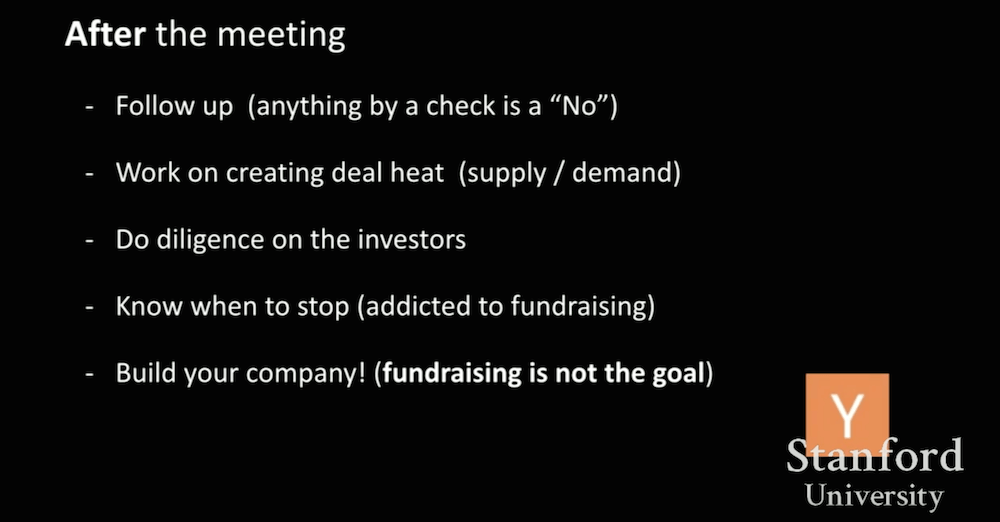
So, a few ideas on what to do after the meeting.
After the meeting: first, as in the case of sales, always stay in touch. It is very important. If you are not written a check and you are not promised to pay the money in another way, then you are refused.
So, if an investor says that he needs to discuss everything with his colleagues, most likely, you were refused. Therefore, you should put a little pressure on your interlocutor. You can “warm up” the deal, that is, show that there is a demand for participation in this round. This is the easiest way to raise your price.
Study your investors in detail. Surprisingly, few entrepreneurs study their investors. The situation resembles the recruitment of new employees. You give a person a part of your company. Therefore, you must know who he is and make sure that he really suits you. And finally - know when to stop. Some founders attract funds so well that they try to do it more often. To attract money is much easier than creating a company.
Dalton: If you managed to attract money, it does not mean that you have succeeded. Few people understand this. We constantly talk about it, but the situation does not change.
Kasar: It seems to me that this is due to the fact that many people think that the funds they have obtained is an achievement in itself. Creating your company is much more difficult.
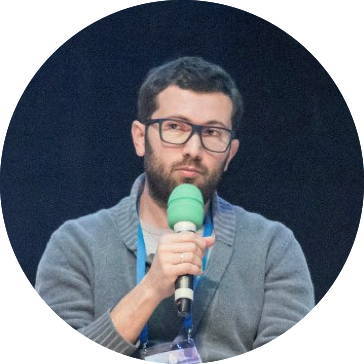 Announcement:
Announcement:January 21, from 19:00 to 20:30 in Nizhny Novgorod, we will talk about how to attract investment in a startup, if it has never done so.
Program and registration here .
Source: https://habr.com/ru/post/297786/
All Articles